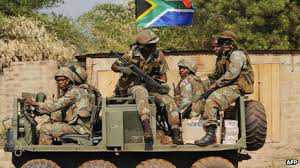 Leon Lotz, a white South African military ‘advisor’ who died in battle with Boko Haram last week, was a Koevoet man.
Leon Lotz, a white South African military ‘advisor’ who died in battle with Boko Haram last week, was a Koevoet man.
In post-Apartheid South Africa, this tag hardly draws any admiration. Koevoet was an Apartheid paramilitary organisation established at the height of the South African Border War in 1979. After the fall of Apartheid, many ex-Koevoet and ex-SADF men established “private military companies”.
PMCs – as they’re commonly known – provide military and security expertise to governments or rebel groups at a premium.
Soldiers of Fortune
Over the past two weeks, it has come to light that the Nigerian government, with its renewed focus to defeat the Boko Haram insurgency ahead of rescheduled elections on March 28, had recruited around 100 mainly former pro-Apartheid soldiers. The news has unsurprisingly attracted much controversy.
The men, mainly tasked with training the Nigerian Defence Force (NDF) in counter-insurgency tactics, form the core of a multinational team of private military security soldiers and experts.
Jakkie Cilliers, director at the Johannesburg-based Institute for Security Studies, told Quartz the move by the Nigerian government to use former South African Apartheid soldiers is largely a strategy for Nigeria to assert itself.
“The Nigerian government is proud, and by asking for assistance from South Africa, or any other African country except Lake Chad Basin Commission countries before an election, Jonathan would suffer humiliation. He doesn’t want to be seen asking for assistance.”
With such a complicated history, and Nigeria’s immediate need to regain control of national security, it’s only fair that we expect complexity, and not easy answers.
John Stupart, editor at Africa Defense Review spoke to Quartz on the role of the Koevoet men in the Nigerian operation.
“This is pragmatic move by the Nigerian government. And I wouldn’t be surprised if these guys stuck around for a while. It’s important to note that their role is not meant to be combative. They’re highly trained counter-insurgency operatives who are in their 60s and 70s. While they may engage in peripheral combat, their role is to mainly train the Nigerian forces,” said Stupart.
Liberation History Cast Away?
Having been born just two years before the fall of Apartheid in 1994, I’ve been curious to know what the former leaders of South Africa’s anti-Apartheid movement – many who now occupy high positions as cabinet ministers, legislators and high-rank civil servants – have to say about this.
For the most part, their silence has been deafening.
The only senior political leader in South Africa to comment on this issue openly and publicly is Nosiviwe Mapisa-Nqakula, minister of Defence and Military Veterans.
Mapisa-Nqakula has an illustrious history in South Africa’s liberation struggle, having left the country in 1984 to undergo military training in the Soviet Union and Angola respectively. She even worked in the political military structures of the ANC from 1986 to 1988.
But through a spokeswoman, Mapisa-Nqakula seemed to stick with South African government’s stock response to the saga which is that no serving members of the army is in Nigeria.
“The SANDF [South African National Defence Force] would like to distance itself from any report which may insinuate any involvement, deployment or existence of its military assets in Nigeria.”
But it is what is not mentioned in the response that draws further questions.
Where is the condemnation from the ruling African National Congress, particularly of the use of former Apartheid soldiers and operatives?
And shouldn’t Nigeria – a country that once offered military training and support to ANC to fight Apartheid – have decided against the use of former Apartheid soldiers?
Having just gained its independence in 1960, Nigeria played a leading role in the establishment of the UN Special Committee against Apartheid in 1960. There are countless of stories of ordinary Nigerians who contributed financially to the anti-apartheid movement, especially in the late 70s, after the historic 1976 youth-uprisings.
Does all of this matter still? Or is this history of solidarity, much like sentimentalism, heart warming and nostalgia inducing, but not enough to determine fidelities in the present?
After all, South Africa’s relationship with Nigeria post-Apartheid has not always been that rosy. Remember when former President Nelson Mandela, willingly accepted a $50 million donation from General Sani Abacha?
The Right Side of History
On the 28th of March, millions of Nigerians will head to the polls, without any interruptions, hopefully. The Koevoet men, having provided stellar training and counter-insurgency tactics once used against Africans in countries like Namibia and Angola, would’ve achieved their short-term task and collected a small fortune.
Back home in South Africa, their place in the country’s history and present will always be questioned. And while many of the Koevoet men are relics of the past which my generation knows little about, they’re a reminder that the past never leaves – it is always with us.
And sometimes it raises its head, recasting itself in a new light to fight for good. This, no matter how noble the intention, can be unsettling.



























